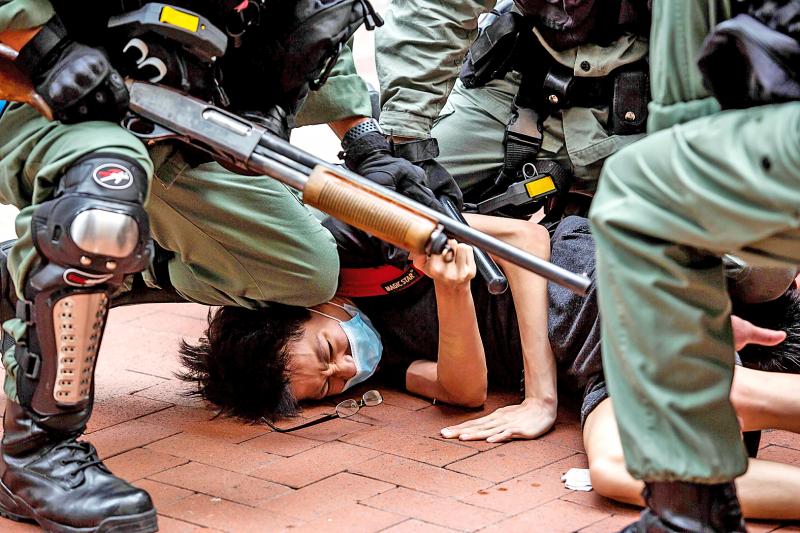The number of people from Hong Kong applying for residency in Taiwan last year rose 41 percent from a year earlier to 5,858, National Immigration Agency statistics showed.
The statistics also showed that 600 applications were filed by Hong Kong residents in the first quarter of this year — three times the number filed in the same period last year — with applicants apparently not deterred by the COVID-19 pandemic.
Just one day after it was reported that the Chinese government plans to enact new national security laws in Hong Kong, inquiries regarding immigration to Taiwan grew 10-fold, a Hong Kong-based immigration consultant was quoted as saying in a Hong Kong media report on Saturday.

Photo: AFP
Separately, a Taiwan-based immigration consultant, speaking on condition of anonymity, said that a series of information sessions they held in Hong Kong in June last year were all filled to capacity.
There was a wave of immigration to Taiwan in 1997 when Hong Kong was handed over to China, followed by a second wave during the 2014 “Umbrella movement,” the Taiwanese consultant said, adding that a third wave occurred last year, around the time of the protests against a proposed extradition bill.
In 2018, there were 4,148 residency applicants and 1,090 permanent residency applicants, agency statistics showed.
Last year, the figures rose to 5,858 and 1,474, respectively.
Of those applying for residency last year, 1,243 people applied in October alone.
Of the reasons given in the residency applications, the top three were “study,” “marriage” and “investment,” in that order.
Sixteen possible ways of applying for residency are stipulated in the Regulations Governing Residency or Permanent Residency for People of the Hong Kong Area and the Macau Area (香港澳門居民進入臺灣地區及居留定居許可辦法). These include applying as a blood relative or spouse of a Taiwanese, as a skilled person holding a Hong Kong Government-issued certificate in a specialized field, as a person of extraordinary accomplishment in a specific field, or as a businessperson investing NT$6 million (US$199,940) or more in Taiwan.
People from other countries immigrating to Taiwan through investment must invest a minimum of NT$30 million, but those from Hong Kong can immigrate with a significantly lower investment, making Taiwan an appealing option, the Taiwanese consultant said.
Those applying as entrepreneurs can come on an even lower investment of only NT$2 million, but they must reside in Taiwan for at least 183 days per year for five years in a row before they are eligible for citizenship, the consultant said.

CHAOS: Iranians took to the streets playing celebratory music after reports of Khamenei’s death on Saturday, while mourners also gathered in Tehran yesterday Iranian Supreme Leader Ayatollah Ali Khamenei was killed in a major attack on Iran launched by Israel and the US, throwing the future of the Islamic republic into doubt and raising the risk of regional instability. Iranian state television and the state-run IRNA news agency announced the 86-year-old’s death early yesterday. US President Donald Trump said it gave Iranians their “greatest chance” to “take back” their country. The announcements came after a joint US and Israeli aerial bombardment that targeted Iranian military and governmental sites. Trump said the “heavy and pinpoint bombing” would continue through the week or as long

TRUST: The KMT said it respected the US’ timing and considerations, and hoped it would continue to honor its commitments to helping Taiwan bolster its defenses and deterrence US President Donald Trump is delaying a multibillion-dollar arms sale to Taiwan to ensure his visit to Beijing is successful, a New York Times report said. The weapons sales package has stalled in the US Department of State, the report said, citing US officials it did not identify. The White House has told agencies not to push forward ahead of Trump’s meeting with Chinese President Xi Jinping (習近平), it said. The two last month held a phone call to discuss trade and geopolitical flashpoints ahead of the summit. Xi raised the Taiwan issue and urged the US to handle arms sales to

State-run CPC Corp, Taiwan (CPC, 台灣中油) yesterday said that it had confirmed on Saturday night with its liquefied natural gas (LNG) and crude oil suppliers that shipments are proceeding as scheduled and that domestic supplies remain unaffected. The CPC yesterday announced the gasoline and diesel prices will rise by NT$0.2 and NT$0.4 per liter, respectively, starting Monday, citing Middle East tensions and blizzards in the eastern United States. CPC also iterated it has been reducing the proportion of crude oil imports from the Middle East and diversifying its supply sources in the past few years in response to geopolitical risks, expanding

Pro-democracy media tycoon Jimmy Lai’s (黎智英) fraud conviction and prison sentence were yesterday overturned by a Hong Kong court, in a surprise legal decision that comes soon after Lai was jailed for 20 years on a separate national security charge. Judges Jeremy Poon (潘兆初), Anthea Pang (彭寶琴) and Derek Pang (彭偉昌) said in the judgement that they allowed the appeal from Lai, and another defendant in the case, to proceed, as a lower court judge had “erred.” “The Court of Appeal gave them leave to appeal against their conviction, allowed their appeals, quashed the convictions and set aside the sentences,” the judges